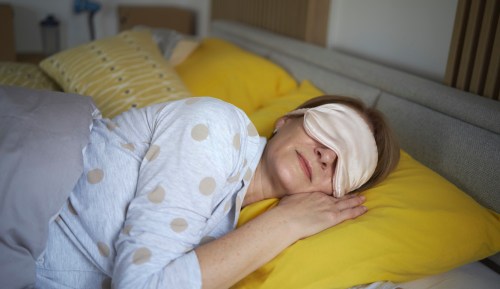A Good Thing You Can Do for Your Sleep Is Wear an Eye Mask
Experts say wearing an eye mask is a simple behavior modification and an easy way to block out light, which is essential for quality sleep.

One of my main priorities this year is to get better, more restful sleep by making my bedroom an environment that’s more conducive to quality zzzs and by changing my habits. So far I’ve tried limiting news consumption with the chunking method and not working in my bed so it’s an oasis for dreams and rest only. But I found a simple, helpful additive to my better sleep quest shoved into the back of a drawer when I was decluttering my dresser—a lavender, satin sleep mask from Rihanna’s Savage X Fenty line that I’d received as part of a birthday gift.
Experts in This Article
sleep doctor and assistant clinical professor at Keck School of Medicine of USC
clinical psychologist, sleep specialist, author of The Women’s Guide To Overcoming Insomnia, and Director of Sleep Health at Sleepopolis
director of the GW Sleep Disorders Center
A couple months ago, I started wearing the mask consistently. I’d climb into bed, pull it over my eyes, and find that I was able to withstand the light pollution from the street more easily and resist rising when sunlight streamed through my windows. It did take a while to get used to having something over my eyes, and I spent some nights with my eyes open underneath the mask for longer than I’d like to admit. But I was pleasantly surprised by how much this low-effort thing helped. And according to sleep doctors, this easy add-on to a sleep regimen comes backed by science.
The benefits of sleeping with an eye mask
They’re like blackout curtains for your eyelids
Wearing an eye mask when sleeping prevents exposure to light at inappropriate times, which can disrupt our circadian rhythms,” according to Vivek Jain, MD, director of the Center for Sleep Disorders at George Washington University Hospital and associate professor of Medicine at the GW School of Medicine and Health Sciences, says.
The eye mask acts as a shut-off switch, making it easier to create the darkness that helps us drift off. Light sleepers would benefit most from trying out an eye mask, says Dr. Jain. “Different people are differently sensitive to light exposure, both in terms of intensity and timing, therefore, it works best for super sensitive folks,” he adds. It could also be a helpful tool for people who have to counteract their body’s natural rhythms, like shift workers.
“Wearing an eye mask when sleeping prevents exposure to light at inappropriate times, which can disrupt our circadian rhythms.”—Vivek Jain, MD, Director of the GW Sleep Disorders Center
They can have a calming effect
Besides the obvious light blocking benefits, there’s just something about pulling the soft fabric over my eyes that soothes me and acts as an appealing close to the day.
According to Shelby Harris, PsyD, director of sleep health at Sleepopolis, while the main benefit has to do with blocking light, “some people may also find that the gentle pressure of an eye mask has a calming effect that helps them fall asleep faster.”
I’ve found that I’m one of these people. Strapping on the lilac eye mask is my last and favorite step of my nighttime routine because it’s the final transition from pre-bed to shut-eye time; that transition lets my brain and my body know it’s not just time to wind down, but totally power off.
Eye masks help adjust to new sleeping environments
My eye mask has also helped provide a measure of comfort when I’m sleeping away from home. A little like sleeping with a stuffed animal, my eye mask is a comforting constant. It’s easy to toss in my suitcase, and I feel better when I put it on in unfamiliar places.
My trusty eye mask has also helped power me through time zone adjustments and catch shut-eye in places that aren’t conducive to quality sleep, like planes.
While eye masks are amazing, they aren’t fool proof
Trying out an eye mask for better sleep is an easy and relatively inexpensive modification to make, but keep in mind that they aren’t a cure-all for sleep disorders like chronic insomnia. It’s better to think of them as one piece of the overall puzzle of healthy sleep hygiene habits, says Raj Dasgupta, MD, pulmonologist and sleep medicine specialist with Keck Medicine of USC says. (When trying out new sleep hygiene practices, he recommends keeping a log to see what is and isn’t working for you.)
If you’re going to try an eye mask, be sure to choose a well-fitting (but not uncomfortable) one that won’t slip or budge during the night. Dr. Harris suggests looking for one made of natural materials like cotton or silk to minimize irritation and breakouts; she adds that both materials are “100-percent natural, lightweight, and have great blackout properties.” And be sure to learn how to clean the eye mask; Dr. Harris recommends forgoing fabric softener and using a scent-free detergent to be gentle around your sensitive eye area.
Sign Up for Our Daily Newsletter
Get all the latest in wellness, trends, food, fitness, beauty, and more delivered right to your inbox.
Got it, you've been added to our email list.










